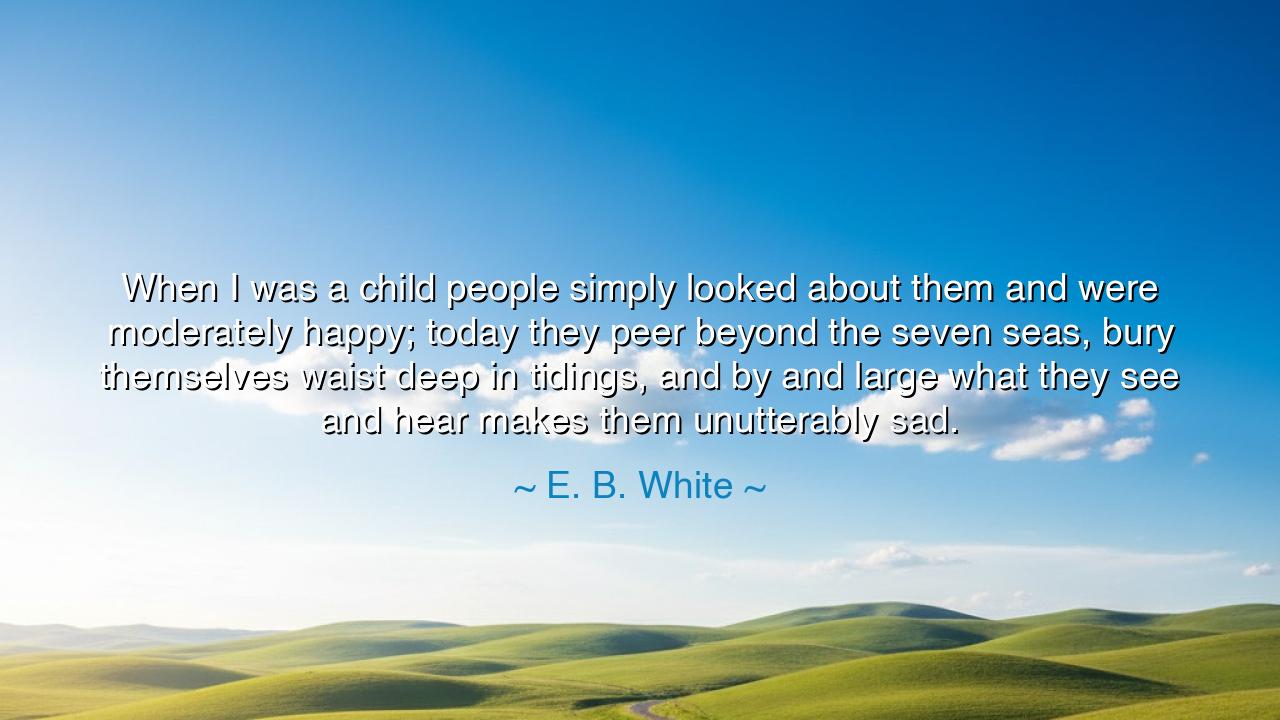
When I was a child people simply looked about them and were
When I was a child people simply looked about them and were moderately happy; today they peer beyond the seven seas, bury themselves waist deep in tidings, and by and large what they see and hear makes them unutterably sad.






There are times when the mind and heart are weighed down by the immensity of knowledge, when the world beyond our immediate sight eclipses the simple joys that once sufficed. E. B. White captured this melancholy when he observed, “When I was a child people simply looked about them and were moderately happy; today they peer beyond the seven seas, bury themselves waist deep in tidings, and by and large what they see and hear makes them unutterably sad.” In these words, we witness the lament of one who recognizes that humanity’s expansion of knowledge and connectivity, while remarkable, carries a burden: the sorrow of seeing suffering and injustice far beyond one’s own hearth.
White’s reflection is rooted in the profound tension between innocence and awareness. In childhood, the world is immediate and comprehensible: joy can be found in the garden, the street, or the home. But as knowledge broadens—through travel, correspondence, or, in modern times, the endless news cycle—one confronts the enormity of human suffering, cruelty, and misfortune. The happiness once taken for granted becomes fragile, threatened by awareness of sorrow beyond reach. This mirrors the ancient recognition that knowledge carries both illumination and weight, as taught by philosophers from Plato to Confucius.
To “peer beyond the seven seas” is to embrace the vastness of the human experience. White captures the modern reality that information flows incessantly, bringing stories of famine, war, and injustice into every home. While the ancients relied on travelers’ tales, epistles, and chronicles, today we are submerged in tidings of all manner, unable to turn away. This flood of knowledge creates empathy but also despair; to know the plight of distant strangers awakens both responsibility and anguish.
History provides poignant illustrations. Consider Dorothy Day, the founder of the Catholic Worker Movement, who was overwhelmed by the suffering she witnessed in the early twentieth century in New York. Yet instead of succumbing to despair, she transformed awareness into action, founding homes for the poor and advocating for justice. White’s observation underscores that knowledge of sorrow can be paralyzing, but it need not remain so; it can also inspire courage, charity, and engagement.
White’s lament is also a meditation on the cost of awareness. To live in the modern world is to be cognizant of both beauty and tragedy, to witness humanity’s achievements alongside its failures. In earlier eras, moderation of knowledge—“moderately happy” observation—allowed for contentment without constant distress. Today, the mind can scarcely rest, inundated with information that reveals suffering on every shore. The challenge lies in balancing awareness with the preservation of joy, cultivating resilience without retreating into ignorance.
The lesson in White’s reflection is timeless: expand your knowledge, but temper it with discernment and action. One must acknowledge the sorrow of the world without being consumed by it. Seek to understand, but also to act where possible, and remember that immediate surroundings—the garden, the home, the neighborhood—remain vital sources of solace and fulfillment. Awareness carries responsibility, but it should not extinguish the capacity for gratitude and simple contentment.
Furthermore, White reminds us that human happiness is not merely the absence of sorrow, but the presence of engagement, perspective, and meaningful connection. The ancients taught that the wise person balances knowledge with equanimity, cultivating both empathy for distant suffering and appreciation for proximal blessings. By learning to navigate this duality, one can live fully, neither ignorant nor overwhelmed, neither callous nor despairing.
Thus, let E. B. White’s reflection guide us: gaze upon the world with understanding, but do not allow the weight of tidings to crush the heart. Seek knowledge, cultivate compassion, and act where possible, but cherish the small, immediate joys of life. In this way, we honor the depth of awareness while preserving the capacity for contentment. To see the world in its entirety is both a gift and a burden, and the wisdom of life lies in balancing the two.






AAdministratorAdministrator
Welcome, honored guests. Please leave a comment, we will respond soon